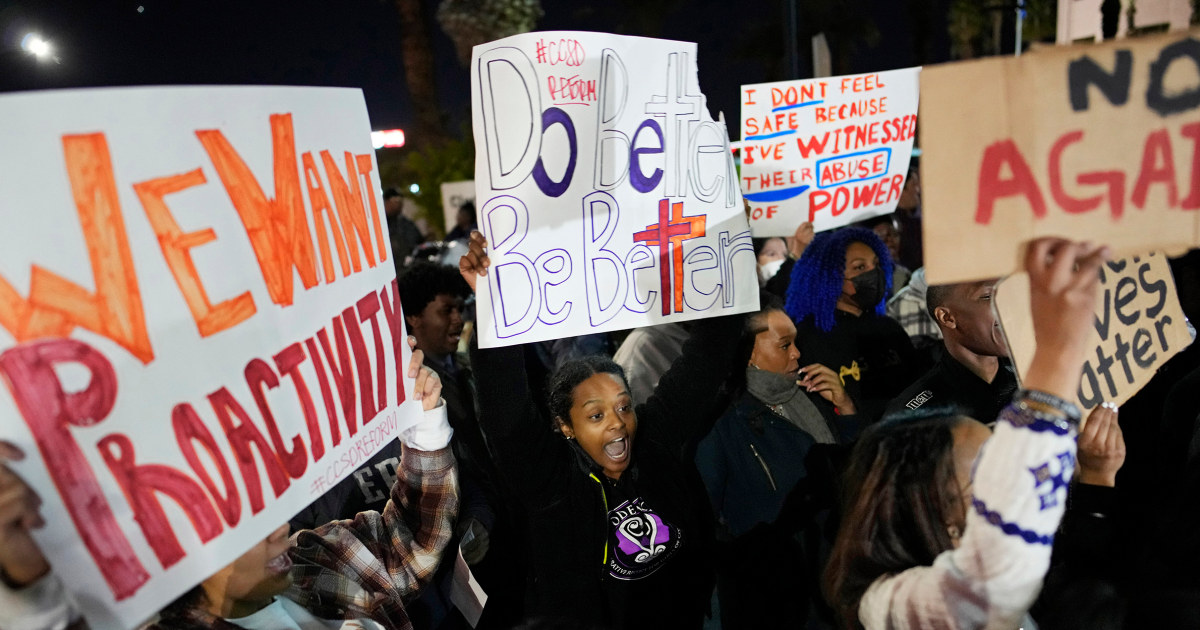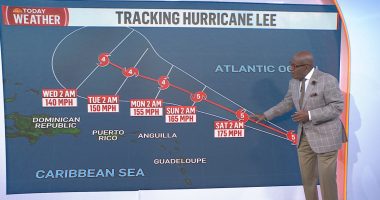
LAS VEGAS — School officials in Las Vegas have released police reports and body camera footage under court order showing a campus officer kneeling on a Black student last year — an incident that drew accusations of police brutality after bystander video of it circulated widely on social media.
In his incident report, Clark County School District police Lt. Jason Elfberg said the teen, whose name is redacted, refused to move away from officers handcuffing another student while investigating a report that a gun had been brandished the previous day and a threat had been made to “shoot up” a Las Vegas school. No weapon was found.
The actions of Elfberg, who is white, pinning the teen beneath his knee next to a patrol vehicle drew public protests, comparisons to the 2020 police killing of George Floyd, calls for Elfberg’s firing and an American Civil Liberties Union of Nevada lawsuit that forced school officials to release information.
Elfberg’s attorney, Adam Levine, told The Associated Press ahead of the release of the bodycam videos that his client, a 14-year police veteran, was cleared of wrongdoing by the district and remains on the school police force.
A student who said police handcuffed him during the encounter for jaywalking told KVVU-TV at the time that the incident reminded him of the killing of Floyd, a Black man, by a white Minneapolis police officer who kneeled on his neck for nearly 10 minutes.
School officials late Thursday complied with a judge’s order to release police body camera footage of the Feb. 9, 2023, incident near the Durango High School campus. The six video clips the district distributed, with faces and parts of some other scenes blurred, total more than two hours.
The Las Vegas-area school district argued that most records of the encounter were confidential because of the age of the people who were detained and denied media requests for them, including one submitted by the AP.
The ACLU on Friday called the district’s fight not to release the records “shameful” and expensive for the organization and taxpayers. It characterized officers’ accounts that the teenagers were stopped during a gun investigation “an attempt to spin the events and avoid accountability for attacking school children.”
The school district said in a statement the ACLU and its clients rejected an offer to receive redacted video last March. It said school administrators followed Nevada law “to protect the identity and safety of minors and the rights of police officers … despite the challenges of that day’s events near Durango High School.”
“This fight is far from over,” ACLU Executive Director Athar Haseebullah told reporters Friday. He said the organization has spent $50,000 on attorneys to obtain the records on behalf of the two students, whose names haven’t been made public. They were 14-year-old male freshmen at the school at the time of the confrontation.
The cellphone video of the encounter that went viral began with several district police officers detaining two students. As another student walked by, recording them with his cellphone, Elfberg yelled to him, “You want next, dude?”
The 55-second video showed the student backing away and lowering his phone before Elfberg twisted him to the ground next to a patrol vehicle. Students in the background could be heard yelling to the officer, “You can’t have him on the ground like that!”
With the student face-down next to the sidewalk curb, the officer kneeled on his back, gesturing toward other young people in the area and keeping his knee in place until the cellphone video ended about 30 seconds later. At one point, the student could be heard asking his friends to call his mother.
Separately, police body camera video showed the teen being handcuffed by another officer, sitting on the curb with his hands behind his back, and Elfberg later acknowledging that the two landed hard on the sidewalk. He encouraged the teen to be checked for injuries, but the teen declined.
In his report, Elfberg wrote that the incident escalated when he ordered the student to “start walking, at which point he said no.”
Elfberg said in his report he grabbed the teen and pushed him against a fence, but “he attempted again to remove himself from my grasp, so I then spun him around and took him down to the ground.”
During a news conference, Haseebullah, ACLU attorney Christopher Peterson and NAACP Las Vegas President Quentin Savwoir said it appeared Elfberg was annoyed that the police activity was being recorded.
Haseebullah called Elfberg “a rowdy police officer” who initiated the incident by “jumping out of his vehicle to approach students who looked at him in a way he didn’t like.” He called for Clark County District Attorney Steve Wolfson to investigate and charge officers with wrongdoing.
“What you see is an officer engaged in misconduct,” Haseebullah said.
Wolfson responded that police conduct investigations and collect evidence, not his office, and that he has prosecuted officers from police agencies throughout the county for various crimes. He said he had no filing seeking prosecution in the Durango High School case.
“I’m not afraid to file a charge in an appropriate circumstance, if and when there is sufficient evidence,” he said.
Peterson emphasized that observers have a constitutional right to “film, criticize and question officers” and noted that video showed Elfberg threatening to use pepper spray on bystanders who “bravely stood their ground on a public sidewalk facing threats of retaliation.”
Later, Elfberg could be heard on his body camera telling a student, “I don’t mind if you record, dude. What I mind is everyone inching up on us.”
Elfberg’s attorney, Levine said the bodycam video “actually shows that Lt. Elfberg defused what could have been a very volatile and dangerous situation for both the officers and the involved students.”
“This case highlights the dangers of jumping to a wrong conclusion based upon snippets of video viewed out of context,” Levine said in his statement. The attorney also represents the school district’s police union.
A 200-person police department covers Clark County schools, the fifth-largest district in the U.S. with more than 315,000 students at more than 350 campuses. District police have the authority to make arrests and issue traffic citations on and off campus.
Source: | This article originally belongs to Nbcnews.com










